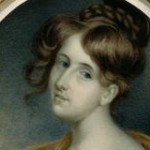Next walking tour: Manchester Literature Festival, Wednesday 6 November 2024.
Meet: St Ann’s Church, St Ann’s Square.
Booking: Please press here to book with Eventbrite.
How this walk works
* A simple walk around Gaskellian sights and sites in the city centre.
* A trip up to the Portico Library where the Rev Wm Gaskell was chairman for 35 years.
* A bus trip to Chorlton-on-Medlock and very interesting Dover Street, once home to the Gaskells.
* A short walk to the excellent museum that is the Elizabeth Gaskell House.
The story so far:
Elizabeth Gaskell was born Elizabeth Stevenson in Chelsea and raised in Knutsford. She worked in Manchester, combating poverty and ignorance, spreading the word about non-conformist Christianity and devising fiendish literary plots.
Gaskell wrote about love: “He could not forget the touch of her arms around his neck, impatiently felt as it had been at the time; but now the recollection of her clinging defence of him, seemed to thrill him through and through—to melt away every resolution, all power of self-control, as if it were wax before a fire.”
She wrote about Manchester cotton: “As they drove through the larger and wider streets, from the station to the hotel, they had to stop constantly; great loaded lorries blocked up the not over-wide thoroughfares… Every van, every wagon and truck, bore cotton, either in the raw shape in bags, or the woven shape in bales of calico.”
She also wrote about smoke and Manchester: “They had taken Franky there to show him Manchester, far away in the blue plain against which the woodland foreground cut with a soft clear line. Far, far away in the distance on that flat plain, you might see the motionless cloud of smoke hanging over a great town, and that was Manchester − ugly, smoky Manchester, dear, busy, earnest, noble-working Manchester; where their children had been born, and where, perhaps, some lay buried; where their homes were, and where God had cast their lives; and told them to work out their destiny.”
Elizabeth Gaskell made her name with the novel Mary Barton: A Tale of Manchester Life even though it was published anonymously in 1848. It covered topics that shocked the shock city – Chartism, murder, hypocrisy, corruption. Cranford (1853) and North & South (1855) cemented her reputation.
Mrs Gaskell was exasperated by the city: “How deep might be the romance in the lives of some of those who elbowed me daily in the busy streets of the town in which I resided,” she sighed. “I had always felt a deep sympathy with the careworn men, who looked as if doomed to struggle through their lives in strange alternations between work and want.”
But this was where she became a revered literary figure − more than just the wife of the minister at the Unitarian chapel; a scion of Dickens, a chronicler supreme.

